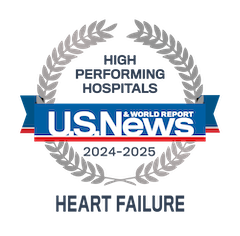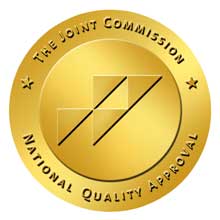Heart Failure and Transplantation
 The Advanced Heart Failure and Transplantation program at UK HealthCare offers a comprehensive and multidisciplinary approach to the treatment of heart disease. Our program combines highly trained and renowned physicians and state-of-the-art technology. We bring together a team of experts from all areas of cardiology who focus on the diagnosis and treatment of heart failure.
The Advanced Heart Failure and Transplantation program at UK HealthCare offers a comprehensive and multidisciplinary approach to the treatment of heart disease. Our program combines highly trained and renowned physicians and state-of-the-art technology. We bring together a team of experts from all areas of cardiology who focus on the diagnosis and treatment of heart failure.
We know the term “heart failure” can be frightening, so our doctors and staff work together to create a treatment program that best suits each individual patient’s needs – from the proper medication, lifestyle modification, ventricular assist support devices or, if necessary, a heart transplant.
Our goal is to provide every patient with exceptionally compassionate care in the safest and most appropriate manner possible based on the best evidence and the latest technological advances.
Patient appointments
Request an appointment online or call one of the locations listed below.
Referrals
Health care providers, please visit our referral page to refer your patient to this service.
About heart failure
Heart failure, also called congestive heart failure, is a condition where the heart cannot pump enough oxygenated blood to meet the needs of the body's other organs. A failing heart keeps pumping, but not as efficiently as a healthy heart. Usually, the heart's diminished capacity to pump reflects a progressive, underlying condition. Heart failure is a condition in which the heart cannot pump out all of the blood that enters it, causing blood to collect in the vessels and fluid to accumulate in body tissues. Nearly 5 million Americans are living with heart failure, and 400,000 to 700,000 new cases are diagnosed each year.
Common risk factors for heart failure are:
- Advancing age
- African-American heritage
- Poorly controlled high blood pressure
- Diabetes
- Family history of congestive heart failure
- History of alcohol abuse
Common signs and symptoms of heart failure
The most common signs of congestive heart failure are shortness of breath, fatigue, and swollen ankles or legs. Another symptom is weight gain due to the buildup of fluid in the body.
What causes heart failure?
Heart failure is usually the result of another condition that makes the heart weak or stiff. Common causes include:
- Coronary artery disease or previous heart attack (myocardial infarction)
- Disease of the heart muscle (cardiomyopathy)
- Heart valve disorder
- Severe high blood pressure (hypertension)
How is heart failure diagnosed?
In addition to a complete medical history and physical examination, diagnostic procedures for heart failure may include any, or a combination, of the following:
- Chest X-ray. A diagnostic test that uses invisible electromagnetic energy beams to produce images of internal tissues, bones, and organs onto film.
- Echocardiogram (also called echo). A non-invasive test that uses sound waves to evaluate the motion of the heart's chambers and valves. The echo sound waves create an image on the monitor as ultrasound equipment is passed over the heart.
- Electrocardiogram (ECG or EKG). A test that records the electrical activity of the heart, shows abnormal rhythms (arrhythmias or dysrhythmias) and can sometimes detect heart muscle damage.
We Are Proof: Real Stories

“I want to be at the stadium and look back at this hospital.”
By the time Jimmy Rhoades got to the hospital, he was sure he was dying. He’d been sick for weeks, first with what his doctors in Owensboro thought was the flu, then pneumonia, then a lung infection. The truth was much worse.

From the Heart, For the Heart
“A patient comes in and they’re essentially at the end of their heart failure. They’ve gone to other hospitals and no help is available for them. To see them to come into UK HealthCare, to qualify for a heart, and then to see those families after transplant, to see them return to their loved ones—I love doing it.” - nurse practitioner, Joy Coles
Treatment options
Heart failure is a chronic disease, but it can be managed successfully with medications and lifestyle changes such as weight loss and exercise. Several medications are available that have been shown to improve symptoms and outcomes in heart failure.
If heart failure is due to severe high blood pressure (hypertension), proper treatment of this can improve symptoms. In a few instances, heart failure can be cured through surgical methods. For example, if heart failure is due to a leaky or narrowed heart valve, surgical repair or replacement of the valve can fix the problem. Devices such as defibrillators and cardiac resynchronization therapy can also help improve symptoms.
Routine medical follow-up is recommended in patients with heart failure. This allows the medical provider to adjust medication as necessary and monitor the patient’s condition. If heart failure worsens to the point that routine daily activities are difficult to perform, advanced treatment options such as heart transplantation or placement of a ventricular assist device may be considered.
ECMO: Extracorporeal membrane oxygenation
ECMO or extracorporeal life support (ECLS) is the process of pumping blood through a device outside the body which provides oxygen to the blood before pumping it back into the patient. ECMO provides long-term management of heart and lung failure while a patient awaits a transplant, ventricular assist device (VAD) or recovers from surgery. Visit our ECMO page for more information.
Remote monitoring with Cardiomems™ Heart Failure System

When the heart is unable to pump enough blood to meet the body’s demands, blood pressure within the heart is elevated, which can lead to heart failure. Measuring pulmonary artery pressure is an early indicator that heart failure is getting worse. Directly measuring pressure through a right-heart catheterization is a standard-of-care practice for patients who have been hospitalized. However, since heart failure is a chronic disease, most days are spent outside the hospital.
In recent years health professionals have found that self and in-clinic monitoring options, which are limited by poor sensitivity to detecting subtle heart failure changes, have resulted in increased admissions to the hospital. To help patients better monitor pulmonary artery pressure, cardiologists at the UK Gill Heart & Vascular Institute are the first in Kentucky to adopt a new diagnostic device, the CardioMEMS Heart Failure System.
The CardioMEMS Heart Failure System uses a miniaturized, wireless monitoring sensor that is implanted in the pulmonary artery during a minimally invasive procedure. The system allows patients to transmit pulmonary artery pressure data from their homes to clinicians at the Gill Heart & Vascular Institute, allowing for personalized and proactive management to reduce the likelihood of hospitalization.
Heart transplantation
The heart transplant program has been active since 1991, having performed over 400 transplants in the program’s history. The success of the heart transplant program is a result of close collaboration between the Gill Heart and Vascular Institute and the Transplant Center. For more information visit the transplant site.
TAH: Total artificial heart
The total artificial heart (TAH) is a mechanical device designed to replace the lower two chamber of the heart (ventricles) that pump blood to the lungs and then out to the body. To learn more, visit our TAH page.
VAD: Ventricular assist device
 Ventricular assist devices (VAD) or ventricular assist systems (VAS) is a surgically implanted pump that helps the weakened lower two chambers of the heart (ventricles) pump blood out to the body and lungs. The UK Gill Heart & Vascular Institute earned The Joint Commission’s Gold Seal of Approval™ for its VAD program by demonstrating compliance with The Joint Commission’s national standards for healthcare quality and safety in VAD care. This certification award recognizes UK’s dedication to maintaining state-of-the-art standards. Gill Heart & Vascular first received the Gold Seal in 2009 and has maintained certification since that time, most recently obtaining recertification in December 2017. For more information visit our VAD page.
Ventricular assist devices (VAD) or ventricular assist systems (VAS) is a surgically implanted pump that helps the weakened lower two chambers of the heart (ventricles) pump blood out to the body and lungs. The UK Gill Heart & Vascular Institute earned The Joint Commission’s Gold Seal of Approval™ for its VAD program by demonstrating compliance with The Joint Commission’s national standards for healthcare quality and safety in VAD care. This certification award recognizes UK’s dedication to maintaining state-of-the-art standards. Gill Heart & Vascular first received the Gold Seal in 2009 and has maintained certification since that time, most recently obtaining recertification in December 2017. For more information visit our VAD page.
Resources
Patient Stories

In good hands: young woman finds help for heart failure
Not long after moving to Kentucky from Florida, Allyson Lovell thought she was having a bad bout with allergies. After all, Kentucky is known for the problems it can cause allergy sufferers.
After a time, other causes were considered. But when several rounds of antibiotics didn’t cure her cough and shortness of breath, Allyson, then 23, knew something was wrong. Read Allyson's story

Heart transplant at UK brings new life to longtime chauffeur
Most of his life has been on the go – as a limousine driver, Lexington native Joseph Madison spent three decades chauffeuring everyone from teenagers attending their first prom to celebrities like the Four Tops and John Michael Montgomery.
Talkative and energetic, Madison never liked to sit still. At one point, he was working three jobs to keep himself busy. But about five years ago, his hectic lifestyle came to a halt when he fell ill. Read Joe's story.



















